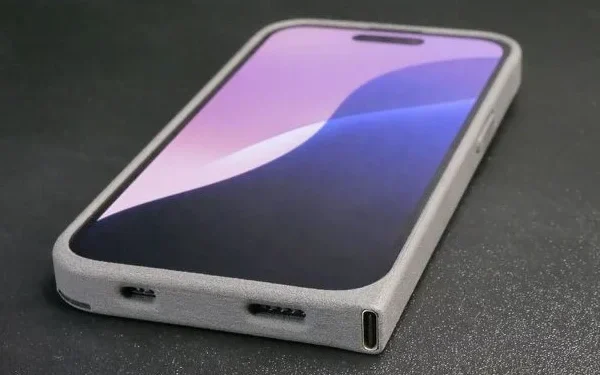Introduction: A Breakthrough for Apple Enthusiasts
In a move that has excited iPhone enthusiasts and tech modders worldwide, Swiss robotics engineer Ken Pillonel has unveiled a game-changing accessory designed to add USB-C functionality to older Lightning-based iPhones. Known for his creative and technically impressive modifications to Apple products, Pillonel’s latest innovation comes in the form of a two-part protective case named “Obsoles”.
This accessory doesn’t just offer a new port—it provides USB-C charging, data transfer, and full compatibility with Apple CarPlay—all without requiring any internal hardware modification to the phone itself. The Obsoles case is being hailed as a clever, practical solution to a long-standing issue faced by many iPhone users still relying on Apple’s now-aging proprietary Lightning standard.
The Problem with Lightning: Background on Apple’s Legacy Connector
Apple introduced the Lightning port in 2012 with the launch of the iPhone 5, replacing the larger 30-pin dock connector that had been standard in earlier iPhones and iPods. While the Lightning connector was revolutionary at the time—offering reversible orientation and a slimmer design—it has since become a source of frustration for users in a tech landscape dominated by the more universal USB-C standard.
Over the years, as Android smartphones, tablets, laptops, and even Apple’s own iPads and MacBooks adopted USB-C for charging and data transfer, iPhones remained locked to the proprietary Lightning port. This inconsistency has led to:
- The need to carry multiple charging cables
- Limited third-party accessory compatibility
- Slower data transfer speeds
- Frustration among users who own devices with different charging standards
In 2023, Apple finally shifted the iPhone 15 series to USB-C due to increasing regulatory pressure, particularly from the European Union, which mandated USB-C as a universal charging standard for all mobile devices. However, millions of older iPhone models—including the iPhone 14 and earlier—remain dependent on the Lightning port.
Ken Pillonel: The Engineer Who Challenged the Status Quo
Ken Pillonel is no stranger to innovation within the Apple ecosystem. He rose to fame in 2021 when he created the world’s first iPhone with a working USB-C port, a feat that involved reengineering the phone’s internal circuitry. The project required custom PCBs, extensive soldering, and technical knowledge few outside the world of professional hardware engineering possess.
Following that, he also worked on AirPods USB-C charging cases, modifying Apple’s wireless earbuds to work with USB-C rather than Lightning, again earning widespread admiration from the global DIY tech community.
Now, with the launch of Obsoles, Pillonel has taken his vision further—creating a commercial product that allows average users to enjoy USB-C convenience without opening up their iPhones or voiding warranties.
Introducing the Obsoles Case: Features and Design
The Obsoles case is designed with both form and functionality in mind. The product consists of two main components:
- A two-part iPhone case that securely houses the phone, similar to most modern protective covers.
- A custom-designed circuit board integrated into the case that reroutes the internal Lightning port to a fully functional USB-C port externally.
Key Features of Obsoles:
- ✅ USB-C Charging: Supports 9V fast charging, enabling users to quickly charge their older iPhones using any USB-C charger.
- ✅ Data Transfer: Provides full data connectivity via USB-C, ideal for syncing files or backing up to a computer.
- ✅ Apple CarPlay Compatible: Maintains compatibility with Apple CarPlay, ensuring that drivers can still use navigation, music, and calls without disruption.
- ✅ Non-Invasive: Does not require any internal modifications, soldering, or jailbreaking—preserving the phone’s warranty and integrity.
- ✅ Reusable Design: The case can be used on multiple devices of the same model, making it a reusable and eco-friendly solution.
Pillonel has stated that the idea behind Obsoles was to bridge the gap between old hardware and new standards—giving users the chance to extend the lifespan of their iPhones while enjoying the modern conveniences of USB-C.
The Name “Obsoles”: A Nod to Obsolescence and Innovation
The name Obsoles is a clever reference to “obsolescence”, pointing to the issue of planned obsolescence in consumer electronics. Apple has often been criticized for designing products that become obsolete quickly due to non-upgradable components, proprietary connectors, and limited backward compatibility.
By introducing Obsoles, Pillonel is offering users a way to reclaim functionality from their aging devices—promoting sustainability and reducing electronic waste in the process.
“We live in a world where electronics are becoming increasingly disposable,” said Pillonel in an interview. “With Obsoles, we’re giving people the tools to extend the useful life of their devices.”
Compatibility and Availability
The initial version of the Obsoles case is compatible with select older iPhone models that still use the Lightning port, such as:
- iPhone 12 and 12 Pro
- iPhone 13 and 13 Pro
- iPhone 14 and 14 Pro
Future versions may be released for other models based on demand. The case is being sold through Ken Pillonel’s official website and through select tech enthusiast platforms.
Pricing details vary based on model and region, but early reviews suggest that the product is reasonably priced, especially when compared to the cost of upgrading to a newer USB-C iPhone.
User Reactions and Community Buzz
Since its announcement, Obsoles has received positive feedback from tech enthusiasts, engineers, and iPhone users tired of dealing with Lightning cables. Social media platforms like Reddit, YouTube, and X (formerly Twitter) are buzzing with praise for the product.
Tech YouTubers and DIY modding channels have already begun posting reviews and teardown videos, highlighting the elegant design and technical ingenuity behind the accessory.
Some key reactions include:
- “Finally, a real solution for those of us who don’t want to ditch our iPhone 13s just to get USB-C.”
- “This is what Apple should have done years ago.”
- “I love the eco-conscious approach—it’s not just tech, it’s a philosophy.”
Why This Matters: A Step Toward More Sustainable Tech
The Obsoles case is more than just a clever gadget—it’s part of a broader conversation about sustainability in consumer electronics. With billions of smartphones in circulation, small changes like modular add-ons, repairability, and universal charging can have a huge impact on electronic waste reduction.
According to the Global E-waste Monitor, over 50 million metric tons of electronic waste is generated each year globally, and smartphones make up a significant portion of that waste. Products like Obsoles offer a practical solution for tech-savvy users who want to keep their devices functional longer instead of discarding them prematurely.
A Future of Customization?
Pillonel’s invention also represents a broader trend in the world of modular accessories and aftermarket tech innovation. As more users become comfortable with DIY customization, the demand for creative hardware modifications is likely to grow.
In the future, we may see more accessories like Obsoles that allow users to:
- Add USB-C ports to older tablets, game consoles, or wireless headphones
- Integrate wireless charging into non-compatible devices
- Extend the functional lifespan of obsolete gadgets
If the success of Obsoles is any indication, there is a growing market for hardware solutions that blend engineering, design, and practicality.
Conclusion: Bridging the Gap Between Old and New
With the launch of the Obsoles USB-C case for older iPhones, Ken Pillonel has once again demonstrated his commitment to innovative, user-friendly solutions that empower consumers. By delivering a product that combines practical utility, design elegance, and tech accessibility, he has opened a new path for users who want to enjoy the benefits of USB-C without upgrading their entire device.
As the tech world shifts toward universal standards and sustainable practices, solutions like Obsoles are more than welcome—they’re necessary.
























